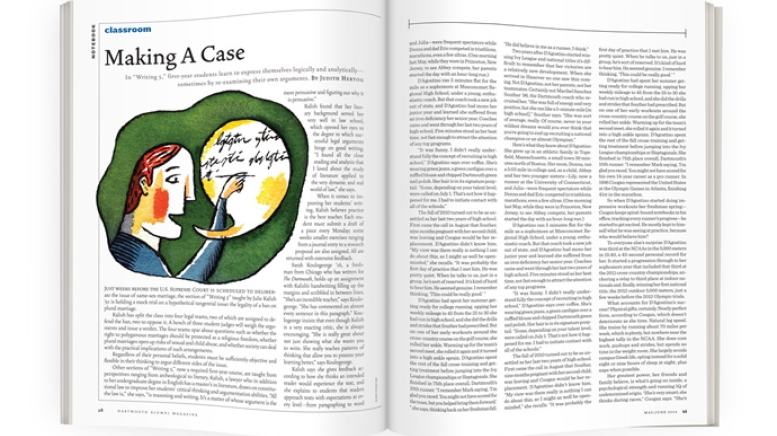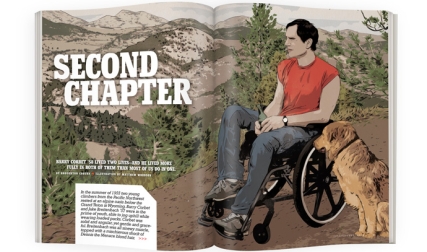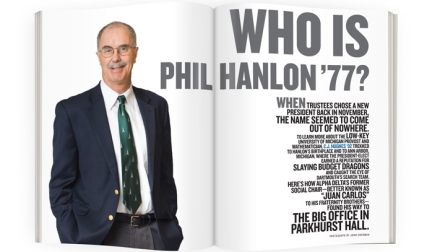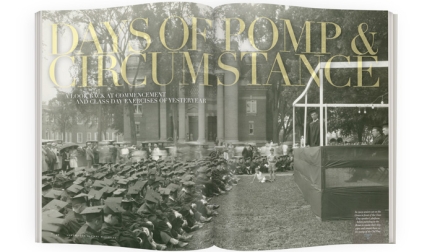Just weeks before the U.S. Supreme Court is scheduled to deliberate the issue of same-sex marriage, the section of “Writing 5” taught by Julie Kalish ’91 is holding a mock trial on a hypothetical tangential issue: the legality of a ban on plural marriage.
Kalish has split the class into four legal teams, two of which are assigned to defend the ban, two to oppose it. A bench of three student judges will weigh the arguments and issue a verdict. The four teams spar about questions such as whether the right to polygamous marriages should be protected as a religious freedom, whether plural marriages open up risks of sexual and child abuse, and whether society can deal with the practical implications of such arrangements.
Regardless of their personal beliefs, students must be sufficiently objective and flexible in their thinking to argue different sides of the issue.
Other sections of “Writing 5,” now a required first-year course, are taught from perspectives ranging from archeological to literary. Kalish, a lawyer who in addition to her undergraduate degree in English has a master’s in literature, draws on constitutional law to improve her students’ critical thinking and argumentation abilities. “All the law is,” she says, “is reasoning and writing. It’s a matter of whose argument is the most persuasive and figuring out why it is persuasive.”
Kalish found that her literary background served her very well in law school, which opened her eyes to the degree to which successful legal arguments hinge on good writing. “I found all the close reading and analysis that I loved about the study of literature applied to the very dynamic and real world of law,” she says.
When it comes to improving her students’ writing, Kalish believes practice is the best teacher. Each student must submit a draft of a piece every Monday; some weeks smaller exercises ranging from a journal entry to a research proposal are also assigned. All are returned with extensive feedback.
Sarah Koulogeorge ’16, a freshman from Chicago who has written for The Dartmouth, holds up an assignment with Kalish’s handwriting filling up the margins and scribbled in between lines. “She’s an incredible teacher,” says Koulogeorge. “She has commented on almost every sentence in this paragraph.” Koulogeorge insists that even though Kalish is a very exacting critic, she is always encouraging. “She is really great about not just showing what she wants you to write. She really teaches patterns of thinking that allow you to process your learning better,” says Koulogeorge.
Kalish says she gives feedback according to how she thinks an intended reader would experience the text, and she explains to students that readers approach texts with expectations at every level—from paragraphing to word choice as well as the kind of arguments to which they are receptive. It all matters. Anything that interferes with effective communication needs to be addressed, she says. Students learn how to assess a context and choose the best mode of communication. This means they need to learn a broad range of writing options as well as the strategies for making those choices effectively.
Caroline Sohr ’16, who is considering majoring in classical studies, found that her favorite assignment was a syllogism for a pending U.S. Supreme Court case about the legality of collecting DNA evidence from suspects. After Sohr had written a defense of the practice, her next assignment was to write a syllogism against the first argument, finding the weaknesses in her original reasoning.
“That was a really cool exercise,” she says. “It taught us how to use logic and forced us to reconsider and scrutinize our own thinking.”
When Sohr arrived at Dartmouth she considered herself a good writer and didn’t think she needed any additional instruction. She soon understood that “Writing 5” uses a different approach than her high school courses. “[Professor Kalish] has taught us that you can never be done writing,” says Sohr. “There are always improvements to be made, even when you think it’s perfect.”
Indeed, Kalish allows students to submit multiple rewrites of their papers. Some students resubmit many times.Others choose not to improve their original grade. The students who opt to spend more time revising benefit more from the course. Kalish recalls how one student caught on to her strategy and exclaimed: “I get it. It’s a win-win situation. We get to improve our grade, and you get our writing to improve.”
According to Kalish, the most difficult transition from high school to college writing is to expand beyond writing models commonly taught in secondary schools. She argues that the way we write can affect the way we think: “Writing is so integrated with how we learn and how we come to know things that simpler models are no longer useful when our ideas are more complex.”
Students come to appreciate that to be strong writers they need to be rhetorically flexible—versatile, adaptable, mobile. Kalish explains, for example, that in Gonzales v. Carhart, which upheld the Partial-Birth Abortion Ban Act of 2003, the majority opinion utilized emotionally charged rhetoric, in contrast to the dissent, which drew on logical legal argumentation.
The class mock trial does not end in a unanimous decision: Two student judges vote to uphold the ban on plural marriages. The third judge dissents. Sohr, one of the two judges in favor of the ban, argues that although freedom of religion is an important principle, it is not absolute and is trumped by the need to protect children from abuse. Thomas Militello ’16 counters, in his dissenting opinion, that consenting adults should be free to marry according to their own principles.
Kalish points out that even though judges reach their decisions through legal reasoning, they still have personal biases like all people. There is not one right answer. By studying the workings of the legal system, students learn to see that society creates truths through reasoning. “Pretty much anything is up for argument, if you can make a good one,” says Kalish.
Judith Hertog is a frequent contributor to DAM. She lives in Norwich, Vermont.




